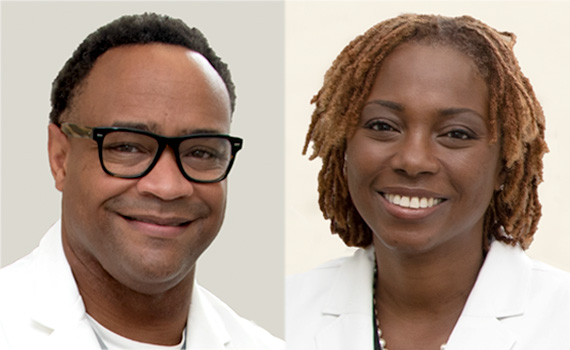By Kiara Harris
 Above: Hernando Carter, M.D., and Adrienne Carter, M.D., Clinical Assistant Professors in General Internal Medicine
Above: Hernando Carter, M.D., and Adrienne Carter, M.D., Clinical Assistant Professors in General Internal Medicine
It was a patient who regularly attended her scheduled appointments but refused to take her medication that left Dr. Hernando Carter perplexed.
“I want to make sure my natural methods are working,” the patient explained.
However, her natural methods were not working. As her longtime physician, he had presented the benefits of her prescription’s multiple times. Still, she assured him that no matter what he said, she was not interested in taking his recommendations.
So, he decided to take a different approach. He simply asked his patient, “Why?”
The patient confided in him that her mother had been prescribed the same medication shortly before she became seriously ill. She was convinced the medication was the cause.
At that moment, the mutual exchange of trust helped each of them take a new perspective on the patient’s health and work together to improve it. This type of relationship between doctors and their patients is essential in the medical practice known as “primary care.”
Primary care doctors are generalists who provide comprehensive healthcare, and they may be known by many other names: general internists, family medicine physicians, or pediatricians. They can diagnose and treat a large majority of conditions and illnesses, and they often see their patients over the course of a lifetime.
It is this type of care that Dr. Carter knew he wanted to practice from the first time he went to his childhood pediatrician. “I learned that relationships were important to me. It is rewarding to be able to see a patient over time. They learn to trust you,” says Dr. Carter.
His wife, Dr. Adrienne Carter, who is also a primary care physician, agrees. Both see patients at The Whitaker Clinic of UAB Hospital. They note that the ability to build lasting relationships with their patients while promoting health within the community is the heart of primary care.
Adrienne observes that the primary care relationship is not only important for routine care, it is often the first line of defense against more serious diseases.
Adrienne recalls keeping a scheduled appointment with a patient on a day where she felt particularly rushed in clinic. Taking time to listen carefully wasn’t easy, but it made a huge difference. During the visit, Adrienne patiently uncovered details that concerned her. Test results confirmed that her patient was experiencing symptoms caused by an aggressive cancer, which was successfully treated. Now, she has his lifelong trust.
“Never take for granted what a patient is saying, or let personal biases influence how you care for them,” says Adrienne.
These relationships have not only helped improve health for their individual patients, but also have been beneficial in addressing patient concerns and combating misinformation during the pandemic. Adrienne and Hernando express how they have used commonality, their personal experiences, and open communication to educate patients.
In one such case, Hernando’s familiarity with his patient meant he was able to recognize warning signs of an illness over the phone.
“I was calling a patient about something unrelated. I thought something didn’t sound right in his voice,” explains Hernando. The patient’s unusually low energy left him concerned. After asking a series of questions, Hernando advised the patient to get tested for COVID. The test came back positive.
Despite its significant challenges, both doctors recognize ways the pandemic has enabled them to grow as physicians. Adrienne says that the adoption of tele-health has allowed her to understand more about her patients. Being able to see their homes, meet their families, and expand her communication style has been rewarding.
What is even more satisfying is when a patient trusts a physician enough to refer their loved ones. “I have several patients where I take care of the mom, dad, and children when they phase out of pediatric care,” says Hernando.
These types of relationship are common in primary care. It is the ability to influence a patient’s overall health that drives both Adrienne and Hernando. Both doctors hope to help patients and their families maintain health as long as they can to experience the fullness of life, together.
The two also work to propel the next generation of healthcare professionals. Through their nonprofit, Prescriptions for Better Living, Adrienne and Hernando provide scholarships for underrepresented individuals interested in pursuing a career in medicine. They also offer mentorship to encourage students during the rigorous education process.
Through mentorship, they aim to address diversity gaps in medicine which will in turn improve health disparities. The doctors recognize that some patients are resistant to the healthcare system. However, they believe building a community of diverse physicians is the solution to solving this problem.
Until this mission is fulfilled, the doctors want to emphasize the importance of everyone finding a primary care physician they can identify with.
“Like any relationship, there must be compatibility and trust.” Hernando continues, “Keep looking until you find that match. It makes all the difference in your health outcomes.” He concludes.